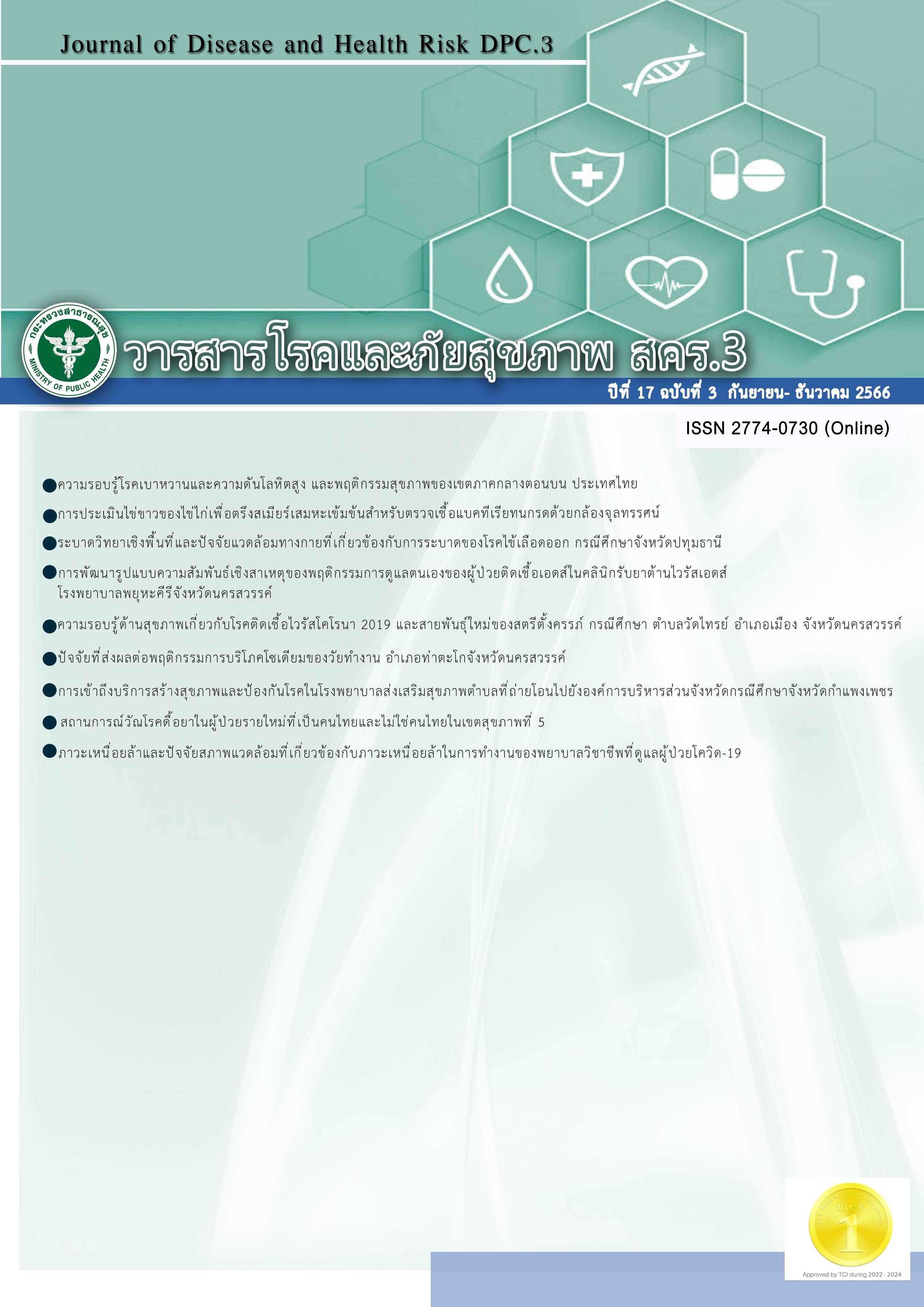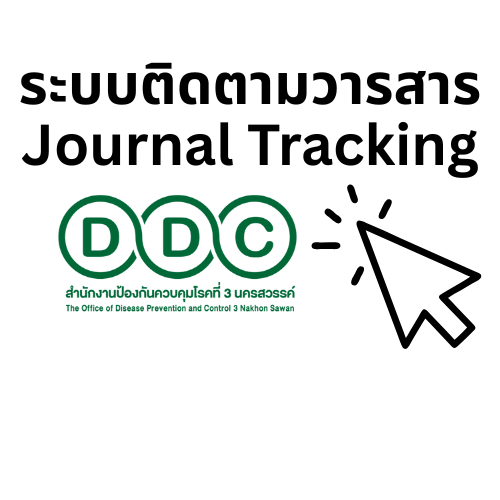Job Burnout and Environmental Factors Related to Job Burnout in Registered Nurses Caring for Patients with COVID-19 Infection
Keywords:
Nurse, Job Burnout, COVID-19 patientsAbstract
This descriptive research aimed to assess job burnout and environmental factors related to job burnout among registered nurses caring for patients with COVID-19 infection. The samples were 300 registered nurses who cared for patients with COVID-19 infection at Udon Thani Hospital. Data were collected from November 2021 to May 2022. The research tools consisted of the Thai version of the Maslach burnout inventory (MBI) questionnaire and a questionnaire for job-related environmental factors in registered nurses who cared for patients with COVID-19 infection. The Cronbach’s alpha coefficient was used to test the reliability of the research tool with a value of 0.87. Data were analyzed using descriptive statistics; frequency, percentage, mean, and standard deviation. Pearson’s correlation coefficient was used to determine the correlation between related factors. The results revealed that; The registered nurses experienced high levels of burnout in 2 dimensions: emotional exhaustion ( =31.2, SD=8.4) and personal accomplishment ( =31.7, SD=4.7) while depersonalization was at a moderate level ( =9.9, SD=5.5). The factors significantly related to job burnout in registered nurses were as follows. 2.1 Demographic data related to emotional exhaustion included sleeping time (r=0.45, p<0.01), economic status (r=0.35, p<0.01), and working time (r=0.27, p<0.01). Economic status was also related to depersonalization (r=0.22, p<0.01). 2.2 For environmental factors related to job burnout, the job characteristic was moderately related to personal accomplishment (r=0.44, p<0.01) but it revealed a very low correlation with emotional exhaustion (r=0.17, P<0.01). The interpersonal relationship and perception of administration were also slightly related to personal accomplishment (r=0.23, p<0.01 and r=0.26, p<0.01, respectively). The research findings encourage the nursing administrator to support registered nurses in terms of their work to reduce job burnout and bring about happiness at work.
References
Worldometer COVID-19 CORONAVIRUS PANDEMIC. [internet].2022. [cited 2022 Dec 17]. Available from: https://www.worldometers.info/coronavirus/.
Suraiya Manmana, Sopon Iamsirithaworn, Sumonmal Uttayamakul. Coronavirus Disease-19 (COVID-19Journal of Bamrasnaradura Infectious Diseases Institute 2020;2: 124-133. (in Thai)
Wan Z, Lian M, Ma H, Cai Z, Xianyu Y. Factors associated with burnout among Chinese nurses during COVID-19 epidemic: A cross-sectional study. Journal of Research Square 2020;1:1-8.
Wang QQ, Lv WJ, Qian RL, Zhang YH. Job burnout and quality of working life among Chinese nurses: A cross‐sectional study. Journal of Nursing Management 2019; 27: 1835-44.
Guixia Liu, HUI, Zhang. A study on burnout of nurses in the period of COVID-19. Psychol Behav Sci 2020; 9: 31-6.
KISA, S. Burnout among physicians and nurses during COVID-19 pandemic. European Journal of Environment and Public Health 2020; 4: 1-3.
Pornnipa Harnlakorn, Tharinee Phetcharat, Nipharphan Rithirod, Sudthanom Kamollerd, Thurnjai Pitayavatanachai, Atibordee Meesing. Stress Worry and Effects among Health Personnel During Pandemic of Coronavirus Disease 2019 in Srinagarind Hospital. Srinagarind Med Journal 2021; 4: 488-94. (in Thai).
Lai J, Ma S, Wang Y, Cai Z, Hu J, Wei N, et al. Factors associated with mental health outcomes among health care workers exposed to coronavirus disease 2019. JAMA Network Open 2020; 3: 1-12.
Supannee Pumfang, Boonjai Srisatidnarakul. Factors of Job Stress for Professional Nurses in Tertiary Hospital. Kuakarun Journal of Nursing 2015;2: 140-53. (in Thai).
Kaman Jearong, Chayanika Srivichai. Relationship between Working Environment Factors and Burnout of Nurses, Community Hospital of Pathumtani Province. Journal of The Royal Thai Army Nurses 2017; Supplement: 299-305. (in Thai).
Krejcie RV, Morgan DW. Determining Sample Size for Research Activities. Educational and Psychological Measurement. 30, 1970; 607 –10.
Maslach C, Jackson SE, Leiter MP. Maslach burnout inventory. Scarecrow Education; 1997.
Siraya Sammawart. Burnout among nurses in Ramathibodi Hospital [thesis]. Bangkok: Mahidol University; 1989. (in Thai).
Amornrat Junyotha,Suttinun Chantanakul, Chalermchai Chaikittiporn, Sukhontha Siri. Fatigue And Factors Related To Fatigue Among Registered Nurses In A Tertiary Hospital. Journal of The Royal Thai Army Nurses2017; Supplement: 166-74. (in Thai).
Dussadee Udomittipong, Krittanai Kaewyot, Keyunmart Yootin. Burnout Syndrome Among Nurses. Journal of Somdet Chaopraya Institute of Psychiatry 2014; 2: 40-53. (in Thai).
Malee Kumkong, Athipa Amornpiyaphakorn, Punnaphat Chramnanpho. Skills for Happy and Successful Working in the Nursing Profession. Health Science Journal Thai 2022; 1:75-85. (in Thai).
Warunee Tangsathajaroenporn, Thanee Kaewthummanukul, Acharaporn Sripusanapan.Work Ability among Professional Nurses in a University Hospital and Related Factors. Nursing Journal 2012; 4: 152-68. (in Thai).
Kasinee Kittiban, Aree Cheevakasemsook, Choochat Phuangsomjit. Occupational fatigue management in professional nurses at Phra Nakhon Si Ayutthaya Hospital. Thai Journal of Cardio-Thoracic Nursing 2021; 1: 121-36. (in Thai).
Savhanya Intarasathaphorn, Orawan Kaewboonchoo, Plernpit Boonyamalik. Work-Life Balance and Factors Associated with Fatigue Among Nurses in a Super Tertiary Hospital. Thai Red Cross Nursing Journal. 2020; 2: 129-43. (in Thai).
Worawan Chutha, Phunnapa kittiratanapaiboon, Kamonluck Makkhlai, Nopporn Tantirangsi. Burnout and related factors in health personnel form the Coronavirus Disease 2019 (COVID-19) pandemic. Journal of Mental Health of Thailand 2022; 2:147-60. (in Thai).
Galanis P, Vraka I, Fragkou D, Bilali A, Kaitelidou D. Nurses' burnout and associated risk factors during the COVID‐19 pandemic: A systematic review and meta‐analysis. Journal of Advanced Nursing 2021; 8: 3286-302.
Manion J. Joy at work: Creating a positive workplace. Journal of Nursing Administration 2003; 12: 652-59.
Haksever C, Render B, Russell RS, Murdick RG. Service management and operations. Pearson College Division, 2000.
Royal Thai Government. The Government Public Relations Department.[internet].2022.[cited 2022 Dec 17].Available from: https://www.prd.go.th/th/content/page/index/id/122110.
Downloads
Published
How to Cite
Issue
Section
License
Copyright (c) 2023 Journal of Disease and Health Risk DPC.3

This work is licensed under a Creative Commons Attribution-NonCommercial-NoDerivatives 4.0 International License.
Copyright notice
Article published in the Journal of Disease and Health Risk DPC.3 Nakhon Sawan. It is considered a work of academic research and analysis as well as the personal opinion of the author. It is not the opinion of the Office of Disease Prevention and Control 3, Nakhon Sawan. Or the editorial team in any way Authors are responsible for their articles.
Privacy Policy
Name, address and e-mail address specified in the Journal of Disease and Health Risk DPC.3 Nakhon Sawan. It is used for identification purposes of the journal. And will not be used for any other purpose. Or to another person.









